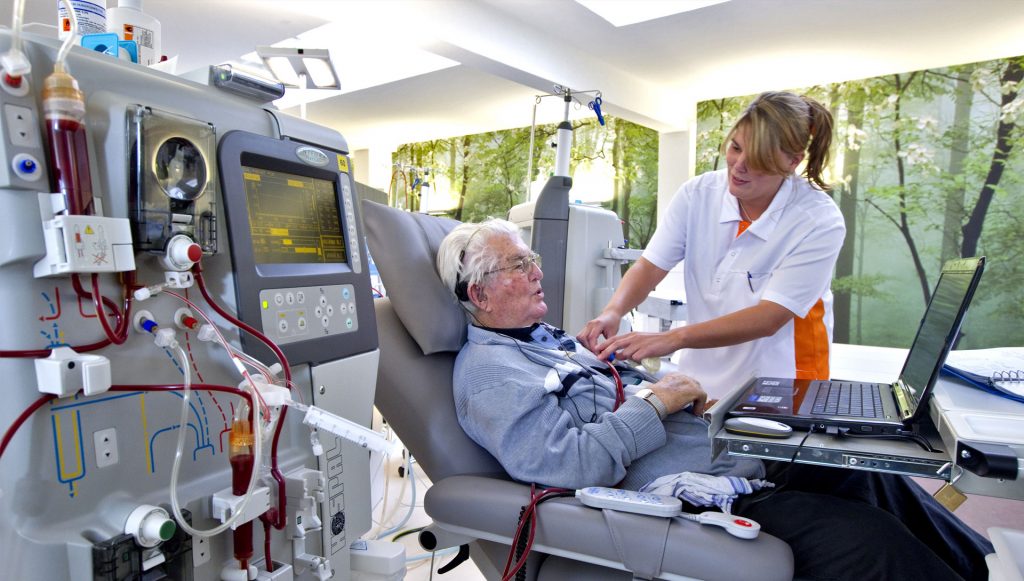
In the Netherlands, the United States, and the United Kingdom, among other countries, dialysis is the standard treatment for patients with advanced chronic kidney damage (CKD), but the question is whether this is always beneficial and desirable.
Factors such as obesity, diabetes, hypertension and an aging population have led to a significant increase in the number of chronic kidney disease patients in recent decades. Among people over 70 years of age, the number of patients with chronic kidney damage is increasing rapidly. However, hemodialysis is an intensive treatment, while elderly patients are often already predisposed due to multiple disorders and functional limitations. Conservative treatment of CKD may be an alternative. This means that the multidisciplinary care team deploys all necessary interventions (except dialysis) in order to maintain the quality of life as possible, with as few complaints and symptoms as possible. This is done with medications, nutritional and lifestyle advice, and appropriate palliative care in the last stage of life. So it’s not so much about extending life.
Hemodialysis or no dialysis
Wouter Verberne, an internist in training at UMC Utrecht, compared the value of dialysis and conventional treatment for elderly patients. He dedicated his thesis to her, most recently receiving his Ph.D. from Leiden University. Verberne conducted a retrospective study, among other things, in which patients aged 70 or older with severe chronic kidney damage who received care at St. Therapy is after – as Viberni says – “a joint decision-making process.” In his letter, he explains that older patients who opted for dialysis lived longer – in general – but the increase in years of life for those over 80 or with multiple diseases was not significant. Meanwhile, the quality of life for both groups of patients appeared comparable and the treatment burden and costs were significantly lower for patients who chose conservative treatment. He offered two caveats: his research group was relatively small and the patients who chose dialysis were initially younger and presumably fitter.
personal considerations
Verben concludes that both treatments are perfect options for elderly patients. As clinicians, we are sometimes still too focused on lab values and the disease itself, but I think we also need to look more at the patient and what he or she cares about: can he/she still do what he/she wants? Patients find the effectiveness of treatment important, but their personal considerations and desires regarding their life and quality are usually more important.
How you translate this into practice, that’s the gist, according to Fairburn. We must move towards a person-centred approach, that is, talking with the patient and asking the right questions in order to first understand together what his or her goals are. The treatment that best contributes to this is then discussed. This selection process must begin in time; Compare it to advanced care planning in this regard. Verberne believes that nephrologists and other healthcare providers involved with chronic kidney patients are in an ideal position to do so, as they often maintain long-term relationships with their patients. “They can get into a conversation with a patient in time about where he might be heading and what that means for him or her.”
quality of life
Conservative treatment is a realistic option for older patients, thanks in part to research by Fairbairn and its promoters Prof. Dr. Willem-Jan Bos (LUMC and St. Anthony’s Hospital in Neugen) and now Prof. Dr. Hans van Delden (UMC Utrecht). In Dutch and European guidelines. A large study (Dialogica) is currently underway in the Netherlands in which the differences between dialysis and conservative treatment are investigated in terms of quality of life and complaints in 1,500 elderly patients in 25 hospitals.
Source
Read also











More Stories
Which can cause an increase in nitrogen.
The Central State Real Estate Agency has no additional space to accommodate Ukrainians.
The oystercatcher, the “unlucky national bird,” is increasingly breeding on rooftops.